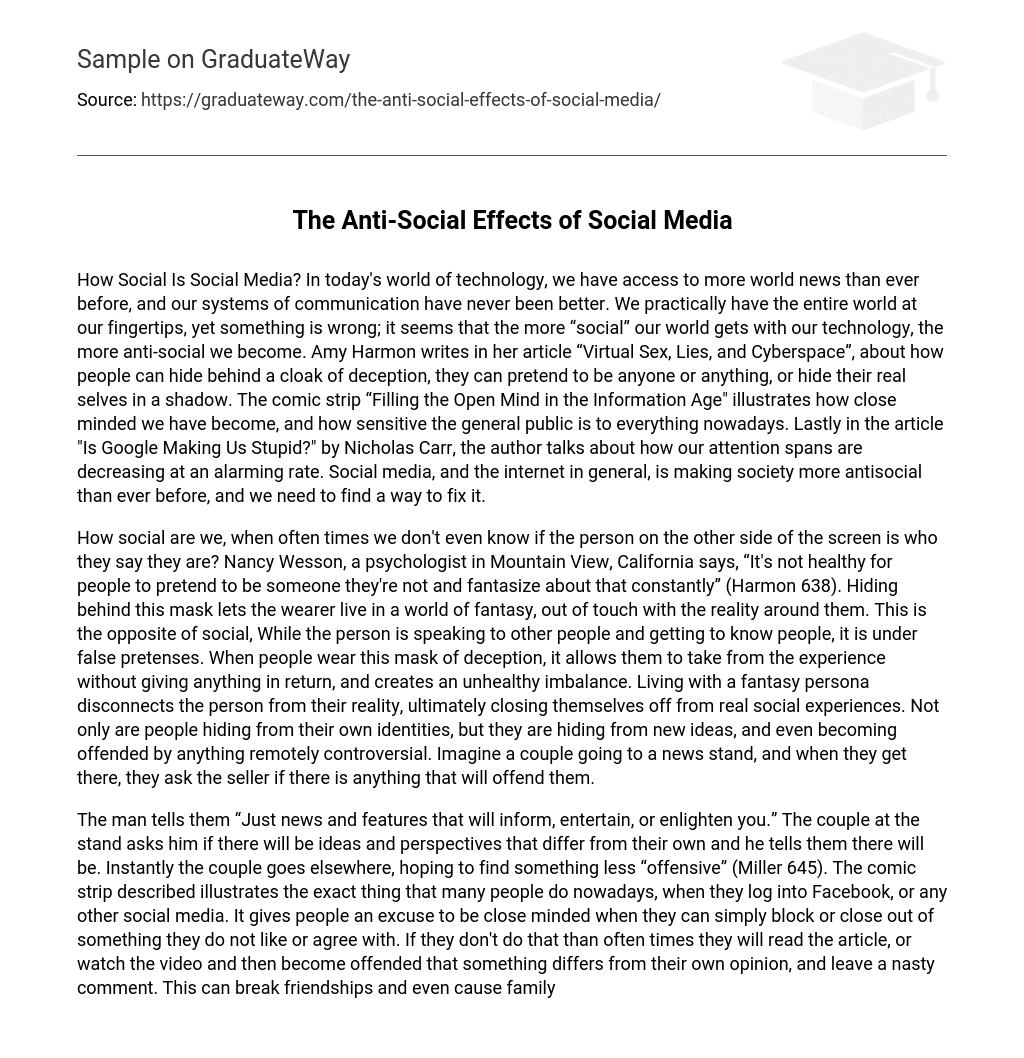How Social Is Social Media? In today’s world of technology, we have access to more world news than ever before, and our systems of communication have never been better. We practically have the entire world at our fingertips, yet something is wrong; it seems that the more “social” our world gets with our technology, the more anti-social we become. Amy Harmon writes in her article “Virtual Sex, Lies, and Cyberspace”, about how people can hide behind a cloak of deception, they can pretend to be anyone or anything, or hide their real selves in a shadow. The comic strip “Filling the Open Mind in the Information Age” illustrates how close minded we have become, and how sensitive the general public is to everything nowadays. Lastly in the article “Is Google Making Us Stupid?” by Nicholas Carr, the author talks about how our attention spans are decreasing at an alarming rate. Social media, and the internet in general, is making society more antisocial than ever before, and we need to find a way to fix it.
How social are we, when often times we don’t even know if the person on the other side of the screen is who they say they are? Nancy Wesson, a psychologist in Mountain View, California says, “It’s not healthy for people to pretend to be someone they’re not and fantasize about that constantly” (Harmon 638). Hiding behind this mask lets the wearer live in a world of fantasy, out of touch with the reality around them. This is the opposite of social, While the person is speaking to other people and getting to know people, it is under false pretenses. When people wear this mask of deception, it allows them to take from the experience without giving anything in return, and creates an unhealthy imbalance. Living with a fantasy persona disconnects the person from their reality, ultimately closing themselves off from real social experiences. Not only are people hiding from their own identities, but they are hiding from new ideas, and even becoming offended by anything remotely controversial. Imagine a couple going to a news stand, and when they get there, they ask the seller if there is anything that will offend them.
The man tells them “Just news and features that will inform, entertain, or enlighten you.” The couple at the stand asks him if there will be ideas and perspectives that differ from their own and he tells them there will be. Instantly the couple goes elsewhere, hoping to find something less “offensive” (Miller 645). The comic strip described illustrates the exact thing that many people do nowadays, when they log into Facebook, or any other social media. It gives people an excuse to be close minded when they can simply block or close out of something they do not like or agree with. If they don’t do that than often times they will read the article, or watch the video and then become offended that something differs from their own opinion, and leave a nasty comment. This can break friendships and even cause family members to part from each other. It seems that if someone does something that differs from someone else’s opinion, it becomes automatically offensive, and therefore wrong. It’s so hard to get people to stop and think about the other side of an argument or idea, and it creates rifts in real life friendships and relationships. It creates an anti-social environment where people can not talk about things in a civil manner.
The anti-social dilemma may be in part because technology itself is shortening the attention spans of many people the more we use it. According to James Olds, a neuroscience professor at George Mason University says that the brain is “very plastic” and “has the ability to reprogram itself on the fly, altering the way it functions” (Carr 651). A sociologist by the name of Daniel Bell would most definitely agree with him. He says we inevitably take on the same qualities of the technologies we use (Carr 651). The way our social media works today is that we click a link and we get the information that we are looking for immediately. Not only that, but generally, it is a short article, less than two or three pages of writing. It is the most efficient way, but it is also creating a short attention span for activities that take more than a few minutes to complete. This can lead people to not have the patience for long conversations, articles, or even videos. People want the simplest answer as fast as possible, and then they would like to be on their way, forgetting all about it until a later date. This way of getting information is hurting our social interactions with each other.
It may seem like nothing can be done to stop the evolution our minds are creating, but this is not the case. If we make ourselves aware to these dangers, then maybe social media can really live up to it’s name. We need to vow never to falsely present ourselves, to be our one true self and show those around us who we really are. We need to stay open-minded and think about things critically. We shouldn’t shy away from every single idea that doesn’t align perfectly to who we are. Lastly, we need to exercise our mind, attempt to stay motivated with activities or readings that take more than a few minutes. Humans are social creatures and we need to maintain that part of us. Social media needs to be that, but in it’s current state, it’s nothing but the opposite.





